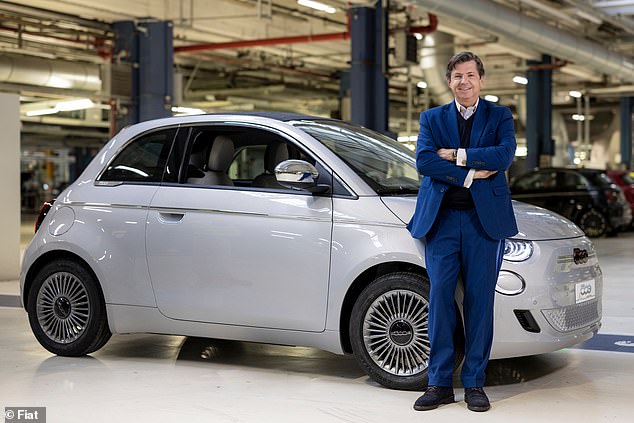You won’t be able to buy a new Jaguar in Britain for a YEAR now that the British brand is scrapping the F-Pace and going fully electric
Jaguar has temporarily stopped selling new cars in Britain after killing its last remaining internal combustion engine model, the F-Pace.
As the manufacturer begins its ambitious new EV-only strategy, there will be a longer pause before the first new-generation Jaguar EV arrives in 2026.
This has left the Castle Bromwich brand without any new cars for sale for over a year – a unique and somewhat questionable sales tactic.
Jag’s one-year hiatus: Once the F-Pace SUV ends production in 2025, there will be no new Jaguar on sale until deliveries of the first new-era EV arrive in 2026
November marks the end of sales of the Jaguar F-Pace SUV in Britain.
After Jaguar announced in April 2023 that it was transforming into an electric-only brand, it was revealed that it would be taking a break from the new car market for at least 12 months.
The British-made XE and the summer was completed.
Now the F-Pace is also bowing out.
Jaguar will not offer new cars to the public and will only sell used models through its dealer network in the meantime.

Jaguar director Rawdon Glover confirmed earlier this summer that ‘there will be a period where you can’t buy a Jaguar’
Jaguar told Coach: ‘From November 2024, sales of new Jaguars will end, ahead of the unveiling of our new brand later this year and product launch in 2026.
‘Although we have now ceased allocating our current generation of Jaguar vehicles, we do have a selection of models available for purchase on an approved pre-owned basis through our UK retail network.’
Although the F-Pace was Jaguar’s bestseller last year (selling 21,943 units and also tripling the I-Pace’s 7,000 units sold), it pales in comparison to the sales of the Range Rover, Range Rover Sport and Land Rover Defender.
A Jaguar spokesperson told This is Money last month that production of the F-Pace for British customers had already ended and the company was only making examples for overseas markets.
To keep motorists interested during the annual break, Jaguar will unveil the first concept version of its first new generation of fully electric models in December.
It will be a four-door GT with a low roof and an entirely new design language for Jaguar that will define the brand’s future as an electric-only vehicle.
The car will cost £100,000 and with a range of more than 450 miles and a 575bhp powertrain, Jaguar bosses promise it will be the most powerful car it has ever sold.
The GT will be followed by a large sedan and an SUV and should go on sale in 2028.
Jaguar wants to become an electric-only brand
In March, Jaguar announced it would scale back production to just SUV models this year, after previously revealing it would go all-electric by 2025.
That was quickly followed by a post-investor meeting announcing that all but one of the remaining cars would take the hit.
Automotive News Europe reported that CEO Adrian Mardell told investors on June 19: “We are eliminating five products, all with lower value.
“These are not vehicles that we have made money on, so we are replacing them with new vehicles on newly designed architectures.”
The five models dropped by parent group JLR (formerly Jaguar Land Rover) were the F-Type sports car, the E-Pace compact SUV, the XE mid-size sedan, the XF premium sedan and the I-Pace electric SUV – all of which are a ‘ close’ experience. to zero profitability’.
It was just the (now also discontinued) F-Pace clinging on.

Fiat CEO Olivier Francois said the car company would reintroduce a petrol version of its 500 city car due to a lack of demand for electric vehicles, especially among older drivers.
Why? Well, Jaguar has decided to go all-electric almost a decade earlier than some brands, despite other manufacturers, including Fiat, Ford, Renault and Porsche, scaling back their electric plans due to low private demand.
Jaguar’s managing director Rawdon Glover partly attributed the lack of EV sales to the fact that the electric cars on offer are indistinguishable from one another.
“When we look at it, it’s a fairly homogeneous sector, and I suspect that may be part of the reason why the BEV sector has been a bit stuck,” he said.
“Basically you want to make a car that actually challenges some of those conventions.”
He continued, “We took a value over volume play, and that’s why we went to the price points we went to.
“I wouldn’t say the development of the EV market is irrelevant, but I think it is less relevant than perhaps it would be if I were in a more commoditized volume segment.”
Some links in this article may be affiliate links. If you click on it, we may earn a small commission. That helps us fund This Is Money and keep it free to use. We do not write articles to promote products. We do not allow a commercial relationship to compromise our editorial independence.
